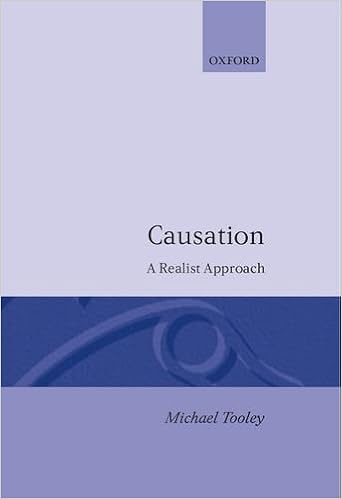
Conjectures and Refutations is one among Karl Popper's such a lot wide-ranging and well known works, striking not just for its acute perception into the way in which clinical wisdom grows, but in addition for employing these insights to politics and to historical past. It presents one of many clearest and such a lot obtainable statements of the basic concept that guided his paintings: not just our wisdom, yet our goals and our criteria, develop via an endless strategy of trial and mistake.
Read or Download Conjectures and Refutations: The Growth of Scientific Knowledge (Routledge Classics) PDF
Similar Epistemology books
What Is Your Dangerous Idea?: Today’s Leading Thinkers on the Unthinkable (Edge Question Series)
The world's top medical thinkers discover daring, awesome, perilous principles which could switch our lives—for larger . . . or for worse . . . From Copernicus to Darwin, to current-day thinkers, scientists have consistently promoted theories and unveiled discoveries that problem every little thing society holds pricey; rules with either confident and dire outcomes.
From Abdullah to Hussein: Jordan in Transition (Studies in Middle Eastern History)
This ebook examines the main turbulent interval within the heritage of Jordan's ruling condo, the six years following the assassination of the kingdom's founder, Abdullah (1951-1957). these years witnessed the country's lone episode of vulnerable monarchy, whilst the king--the amateur Hussein or his ill-starred father, Talal--was now not the preeminent political actor within the land.
The Varieties of Reference (Clarendon Paperbacks)
Gareth Evans, the most outstanding philosophers of his new release, died in 1980 on the age of thirty-four. He have been operating for a few years on a booklet approximately reference, yet didn't entire it ahead of his loss of life. The paintings was once edited for book by means of John McDowell, who contributes a Preface.
Tooley the following units out and defends realist money owed of conventional empiricist reasons of causation and legislation of nature, arguing that due to the fact reductionist money owed of causation are uncovered to decisive objections, empiricists needs to holiday with that culture.
Additional resources for Conjectures and Refutations: The Growth of Scientific Knowledge (Routledge Classics)
With this Kant’s challenge, ‘How is natural usual technological know-how possible’, collapses, and the main anxious of his perplexities disappears. Kant’s proposed answer of his insoluble challenge consisted of what he proudly referred to as his ‘Copernican Revolution’ of the matter of information. Knowledge—episte¯me¯—was attainable simply because we're not passive receptors of experience info, yet their energetic digestors. via digesting and assimilating them we shape and get them organized right into a Cosmos, the Universe of Nature. during this procedure we impose upon the cloth awarded to our senses the mathematical legislation that are a part of our digestive and organizing mechanism. hence our mind doesn't dis61 Kant says there that Newton gave us so transparent ‘an perception into the constitution of the universe that it'll stay unchanged in all time; and notwithstanding there's wish that our perception will ever develop via persisted remark, there by no means desire be worry of a setback’. (Added 1989. ) sixty two Poincaré was once nonetheless drastically afflicted by means of it in 1909. nature of philosophical difficulties conceal common legislation in nature, however it prescribes its personal legislation and imposes them upon nature. This thought is a wierd mix of absurdity and fact. it truly is as absurd because the fallacious challenge it makes an attempt to unravel; for it proves an excessive amount of, being designed to end up an excessive amount of. in response to Kant’s conception, ‘pure typical technological know-how’ isn't just attainable; even supposing he doesn't continually detect this, it turns into, opposite to his goal, the required results of our psychological outfit. For if the actual fact of our attainment of episte¯me¯ should be defined in any respect by means of the truth that our mind legislates for nature, and imposes its personal legislation upon it, then the first of those proof can't be contingent to any extent further than the second one. sixty three hence the matter isn't any longer how Newton can make his discovery yet how every body else may have did not make it. How is it that our digestive mechanism didn't paintings a lot past? it is a patently absurd end result of Kant’s proposal. yet to brush aside it offhand, and to push aside his challenge as a pseudo-problem, isn't really more than enough. For we will be able to find a component of fact in his suggestion (and a miles wanted correction of a few Humean perspectives) after decreasing his challenge to its right dimensions. His query, we now comprehend, or think we all know, must have been: ‘How are profitable conjectures attainable? ’ And our resolution, within the spirit of his Copernican Revolution, may, I recommend, be anything like this: simply because, as you stated, we're not passive receptors of experience information, yet energetic organisms. simply because we react to our surroundings now not continuously simply instinctively, yet occasionally consciously and freely. simply because we will invent myths, tales, theories; simply because we have now a thirst for clarification, an insatiable interest, a desire to be aware of. simply because we not just invent tales and theories, yet test them out and spot whether or not they paintings and the way they paintings. simply because by means of an outstanding effort, by means of making an attempt tough and making many errors, we could occasionally, if we're fortunate, achieve hitting upon a narrative, a proof, which ‘saves the phenomena’; might be by way of making up a fantasy approximately ‘invisibles’, resembling atoms or gravitational forces, which clarify the sixty three a very important requirement which any sufficient idea of information needs to fulfill is that it must never clarify an excessive amount of.



